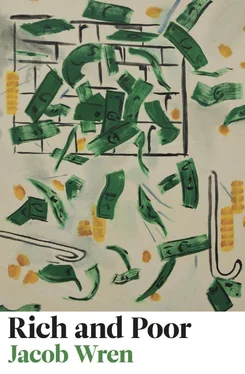But again that’s not precisely how it happened. There was a rush towards a bus and moments later I was seated inside as the bus pulled away. It was early, some time around dawn, and I’d been up all night talking and laughing. I really did like these people, and now I was going to see for myself what a day of work consisted of for them. The bus ride lasted just less than an hour. We were herded off the bus and suddenly everyone was running, rushing to get the best spots. For some reason I don’t rush, and end up with a spot furthest away from where the bus drops us off. As I start to work, carefully observing those around me to see how it is done, it becomes clear why mine is a spot no one else wants. It’s in the shade, where the tomatoes are noticeably less ripe, smaller. I have to search to find ones ready to pick. But what’s worse is I am farthest away from the bins, have to drag my cart across the entirety of the field to have it weighed and receive a token. The cart can barely roll and frequently gets stuck in the mud. I manage to fill it only a few times, and on each of these occasions the time I lose dragging it would have been enough for a more experienced worker to fill it over and over again. At the end of the day you turn in the tokens for cash. Before they give you the cash they deduct the cost of the bus ride, the water you drunk while working in the heat, the meagre lunch I wolfed down in half a minute between trips out to the far side of the field. For most of the others here they’re also deducting the cost of being smuggled over the border, deducting it in daily instalments that seem exorbitant, ridiculous. When we’re done I have only a few tokens and, after the deductions, there’s nothing left. If I was hoping to earn the respect of my fellow workers, I have failed. Even the worst of them managed to pick ten times as much as me. My eyes, hands, mouth, teeth and throat are all irritated from the pesticides. My arms and shoulders ache from picking. My back aches from dragging the cart through the dirt. I am so exhausted I can barely stand.
Back at the encampment, as we pass around a bottle of homemade stuff I should recognize from my teenage years back home but for some reason don’t, the others laugh at me as I tell them about my first day. Some are laughing so hard they can barely remain upright. I realize the story is funnier because I still don’t speak properly. So much of the language has come back but I still miss words, expressing myself awkwardly, getting the expressions wrong. I feel frustrated I can’t put things right, place my words correctly, but even though I’m embarrassed and don’t particularly enjoy being the object of ridicule, I’m nonetheless happy to be entertaining my new friends. Maybe I’m wrong, but it feels they’re laughing at me in a way that only friends can laugh at each other. Then one of them suddenly stops laughing. He’s had a thought, a new question, struck by how obvious this new thought now seems to him. He wants to know why, if I don’t farm, if I’ve never harvested, I mean, what the fuck am I doing here? It makes no sense. No one comes to a place like this just to hang out. Or to make new friends.
I wonder if I should tell them the whole story: pianos, shareholder reports, bonfires, billionaires, elevators and gauze. I do want to tell someone. Having this story inside of me, that no one knows except Emmett, and not even he knows the entire thing, is like acid in my stomach. I feel that telling someone, telling my new friends, would be good for me, like the right kind of medicine, like a cold wind that would clean out my insides. So I think I’ve decided to tell them, open my mouth, wondering how to start at the beginning, which beginning I should choose, but instead find myself explaining that I’ve come to start a union, that their working conditions and pay are abhorrent, anyone can see that things here aren’t right, and if we can organize, if we can all band together, if we can link arms and then hold our ground, I am sure there’s a way for both pay and working conditions to improve. I’m talking and talking and don’t know how to stop, not even sure where this idea came from, or how it replaced my desire to explain what happened before I arrived. But I’ve never been so interested in the past, always much more concerned with the future, and as I talk I find myself wondering if once again I have some feeling that the future exists, if I’ve discovered a new obsession, a new goal, that might replace the overwhelming destruction of past defeats. If I might be coming back to life.
I look around the circle at my new friends. They’re not giving anything away, I can’t tell if or how they’re responding, if I’m in any way convincing, if they think I’m crazy or instead they’re intrigued. We are speaking more quietly now, since so many of those in the field that surrounds us have gone or are going to sleep for the night. I look around, and for the first time I notice just how many tents have been set up, tents that are barely tents, pieces of cheap fabric held in place with a couple of sticks. So many of those here have nowhere else to go. I’m a bit drunk, or more, and so have no difficulty throwing my impasse into the circle — time to be direct, asking everyone, if they’re still listening, what they think. A union is hard work to build and easy to break, one of them says, mainly sounding sad, most of us here don’t have papers, if we fight they can round us up in a second, send us straight home. I’m listening, wanting to temper my response, but I can’t, I’m too excited. They can’t round up all of us, I find myself saying, almost thinking aloud, they need workers. They can’t just let the fruit rot on the vine. Even if we manage to stop work for one day, or half a day, they would lose so much cash. It would be a reality. They would have to deal with us. Plus, they’re not expecting it. We have the element of surprise. I have no idea if what I’m saying is true, if it makes any sense, and for a moment I worry that it’s too much like before. I made a bad plan and followed it through until the end, had the piano wire in my pocket while the entire time it made no sense, hurtling towards such dismal results. But then I cheer myself up, thinking that before I had acted alone, had no help, and now I have my new friends, we can discuss, figure things out together, try to find some way.
1.
I am thinking about scapegoats, wondering if I’m in the process of becoming one. Back when I felt more firmly in charge, there were games I could play, moving the blame around. Now I hesitate, worrying it is too risky, could too easily backfire. Piano-idiot did this to me, making me second-guess myself at every turn, no longer pushing forward with impunity as I once did and have always done. It was only a simple physical attack, I don’t understand how it undermined me so deeply, if that is in fact what is happening, or if it’s instead something else I don’t yet understand. Today there was a memo sent out to only a handful of top-level employees. I don’t know if I was meant to be included in this memo, or if my inclusion was simply accidental, but I read it on the plane to Switzerland and, when I finally got to the hotel at midnight, lay awake thinking about what it said, lay awake practically all night instead of getting the sleep I would desperately need to get me through a series of carefully navigated meetings and lunches that had been scheduled for some time. The meetings would be difficult for many reasons, my exhaustion wouldn’t help matters, and having the memo on my mind would make everything even worse.
It was basically a memo that had nothing to do with me, concerning certain protocols for what to do when things go wrong, more specifically for when things go wrong in one division and a completely different division experiences the most drastic, negative results, often in another part of the world. In the memo a single example is given: A manager allows a strike to escalate in a factory in China. This slows down production, and the roll-out date for a new product in France must be delayed. The product has already been announced, and bad publicity occurs, as well as understandably frustrated consumers. The product therefore does not meet its preliminary sales targets. The head of the division in France feels he is not to blame, he did everything right. He would like the blame to be placed where it is rightfully deserved, and the manager in China be forced to take responsibility for the delay. This memo suggests another solution, a solution that is overwhelmingly familiar to me, that a third party take the blame, someone who has little to do with the situation and who is clearly expendable. This is nothing if not the scapegoat department that I spent a certain period of my life developing, before finally deciding it was more trouble than it was worth.
Читать дальше












